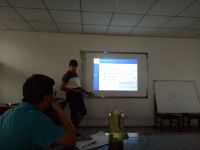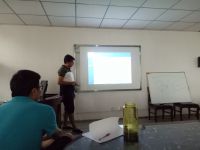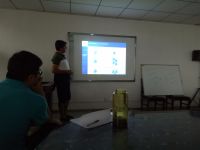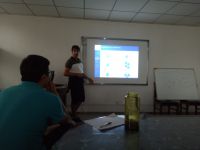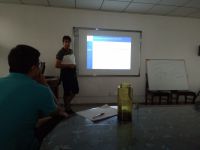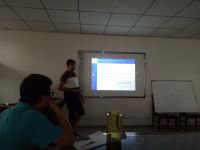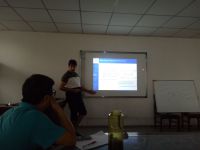Today, on Thursday, July 26, 2018, our first Institute Workshop on Applied Optimization took place. Three talks were contributed by our researchers as well as our international guest researcher Dr. Mohammad Ali Raayatpanah [محمدعلی رعایت پناه] from the Kharazmi University [دانشگاه خوارزمی] in Iran [جمهوری اسلامی ایران]. We believe that a good way to good research is cooperation and the exchange of thoughts. It is especially good to discuss about research from different, but related fields. Each talk led to interesting conversations and hopefully has opened up opportunities for even more inspiring discussions and joint research. This workshop was succeeded by the Second Institute Workshop on Applied Optimization: Seminar on Operations Research and Optimization in 2019.
 I mysellf presented the first talk ,"Automating Research Work in Optimization," a discussion about my most beloved topic, the attempt to improve the results of researchers in optimization and machine learning while reducing their workload of automating parts of it. We have developed a process which can help a researcher to make sense of experimental data by automatically discovering different groups of optimization algorithm and problem instance behaviors. This method considers the complete runtime behavior and can even propose reasons for it. The slides of this talk are available here. Notice that our group co-organized three workshops on benchmarking of computational intelligence methods this year, BOCIA, BB-DOB@GECCO, and BB-DOB@PPSN, as well as one journal special issue.
I mysellf presented the first talk ,"Automating Research Work in Optimization," a discussion about my most beloved topic, the attempt to improve the results of researchers in optimization and machine learning while reducing their workload of automating parts of it. We have developed a process which can help a researcher to make sense of experimental data by automatically discovering different groups of optimization algorithm and problem instance behaviors. This method considers the complete runtime behavior and can even propose reasons for it. The slides of this talk are available here. Notice that our group co-organized three workshops on benchmarking of computational intelligence methods this year, BOCIA, BB-DOB@GECCO, and BB-DOB@PPSN, as well as one journal special issue.
 The second talk, "Revisiting the Price of Anarchy for Non-atomic Congestion Games," was given by Dr. Zijun Wu [吴自军]. Dr. Wu made an remarkable break-through in the research on the price of anarchy, a concept from Algorithmic Game Theory. In particular, his findings show that selfish behavior is asymptotically optimal for the whole system in a wide range of different routing and social production scenarios if there are many agents. His work is inspired by the question whether congestion pricing, i.e., trying to force car-based traffic into different directions during times of heavy traffic, can improve the congestion situation in Beijing. Surprisingly, he finds that it can be proven that this is not the case: In situations with very heavy traffic, the egoistic decisions of single drivers regarding their routes is asymptotically optimal for the whole road network. He shows that this result carries over to other scenarios, which may be an entirely new take on algorithmic game theory. The slides of this talk are available here.
The second talk, "Revisiting the Price of Anarchy for Non-atomic Congestion Games," was given by Dr. Zijun Wu [吴自军]. Dr. Wu made an remarkable break-through in the research on the price of anarchy, a concept from Algorithmic Game Theory. In particular, his findings show that selfish behavior is asymptotically optimal for the whole system in a wide range of different routing and social production scenarios if there are many agents. His work is inspired by the question whether congestion pricing, i.e., trying to force car-based traffic into different directions during times of heavy traffic, can improve the congestion situation in Beijing. Surprisingly, he finds that it can be proven that this is not the case: In situations with very heavy traffic, the egoistic decisions of single drivers regarding their routes is asymptotically optimal for the whole road network. He shows that this result carries over to other scenarios, which may be an entirely new take on algorithmic game theory. The slides of this talk are available here.
 Last but not least, our international guest researcher Dr. Mohammad Ali Raayatpanah [محمدعلی رعایت پناه] presented his talk "Introduction to Network Optimization" on the optimization of routing in networks via linear and integer programming. He starts by introducing the general concepts of how routing, shortest parth, and similar network problems can be represented as linear or quadratic programs. This allows us to solve them using standard tools like GAMS or CPLEX. He then discussed state-of-the-art routing tasks, involving multicasts using network coding as well as quality-of-service. The slides of this talk are available here.
Last but not least, our international guest researcher Dr. Mohammad Ali Raayatpanah [محمدعلی رعایت پناه] presented his talk "Introduction to Network Optimization" on the optimization of routing in networks via linear and integer programming. He starts by introducing the general concepts of how routing, shortest parth, and similar network problems can be represented as linear or quadratic programs. This allows us to solve them using standard tools like GAMS or CPLEX. He then discussed state-of-the-art routing tasks, involving multicasts using network coding as well as quality-of-service. The slides of this talk are available here.
In summary, we had three different talks, all of which investigating questions of optimization from different perspectives. Due to the holiday, our audience was not big though highly interested and there were indeed very useful discussions after each topic.


